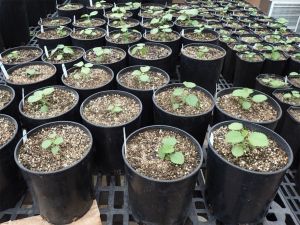Vulnerability of coastal ecosystems to increased salinity from climate change

Coastal habitats are critical for the welfare of island people, providing food, ensuring clean water, stabilizing beaches, and promoting cultural well-being. Due to climate change, coastal habitats are experiencing sea level rise, more frequent storm surges, and increasingly severe droughts, which are certain to negatively impact coastal plants. However, little is known about whether Hawaiian coastal plants can tolerate salinity, and whether salinity tolerance might be greater in invasive coastal plants. We propose a series of experiments to test salinity tolerance in native and invasive coastal plants in order to identify those species likely to be resilient under climate change, and to identify those species that are very sensitive to salinity and will require careful management under climate change. Through partnerships with Maui Nui Botanical Garden, National Tropical Botanical Garden, and Bellows Air Force Base, we will conduct the experiments in highly controlled conditions, including the lab and greenhouse, as well as natural field conditions. The results will be shared with coastal management groups in order to inform conservation of these unique and important plant communities, under the global threat of climate change.
PROJECT DETAILS
FUNDED:
FY2020
PI:
Kasey Barton
Associate Professor of Botany, UH Mānoa
Co-PI:
Anna McCormick
Department of Botany, UH Mānoa

